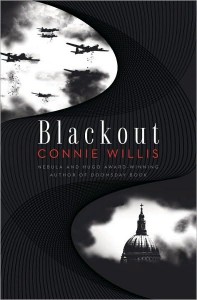I’ve got to begin by saying that it took more than one start at the preceding work, ‘To Say Nothing of the Dog’, before I came to appreciate and love that book. (see this review ) In that instance I decided that my initial resistance derived from the distinctly quirky characters combined with the slow pacing in that work. Both of those qualities eventually become advantageous, especially in counterpoint to numerous plot turns and prat-falls that leap at you in it.
Willis’ follow-up, ‘Blackout’ does not lack for quirky characters and slow-pacing, but, alas, the cook seems to have left out a necessary sufficiency of cunning plot-turns and prat-falls. There is action, but very little sense of forward movement in this novel. A set of characters does have a very significant, shared problem, and individual subsidiary problems engendered by the MAIN problem, which is that they are all time-traveling historians trapped in wartime England during The Blitz, but these characters are so ponderously slow to comprehend and act on their situation, I kept finding myself snarling advice at the leaves of my copy, or pleading with them to change direction. They didn’t listen.
Set aside the plot problems, Willis DOES have an historian’s love and eye for detail, and this work is resplendent with it. And, too, she has an historian’s love for History, itself. The history her characters are living through is the real center of this work, and the central story is one of a besieged citizenry waging war by sheer endurance, courage, and good humor. That is a story worth telling, but it’s a story of gritty daily privation and nightly fearful hiding away from the bombs in shelters. It’s difficult to incorporate any kind of quest within that story. The time-travelers’ problem of returning “home” to 21st century Oxford, along with their angst that one or more of them may have altered time’s fabric is too hackneyed to serve the need for a unifying quest, especially in a novel approaching 500 pages, and closing with an aggravating, “…To be continued!”.
Alas. Yes, the novel does NOT conclude in any way shape or form when you reach the final page. I had this exact problem with another bulky science fiction work I read recently, ‘The Dreaming Void’ by Peter F. Hamilton (see the review ). It’s not insignificant that both books were gifts from the same daughter, (Hmm…) but to the girl’s credit she also gave me the sequel, Willis’ ‘All Clear’. I started it just last night, and have hunkered down in the shelter of my armchair to transit the 600-some pages it offers. I am placing my faith and hope in Willis drawing all the threads into place, and hope to report that it proves to be a tapestry worthy of the The National Gallery in London.
Magnum opus, anyone?
